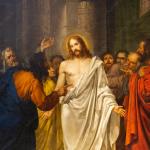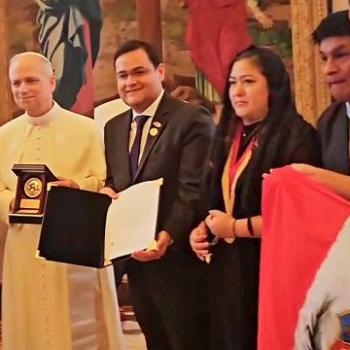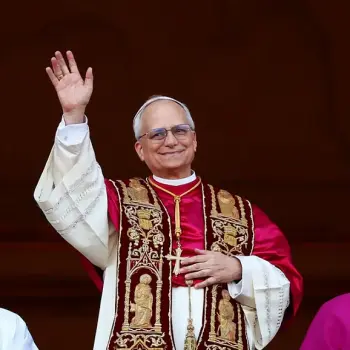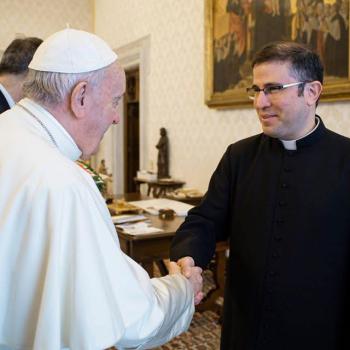Last week, Bishop Stephen Parkes of Savannah issued a letter outlining upcoming changes in the celebration of the Extraordinary Form of the Roman Rite in the Diocese. On my own accord, and speaking as an individual (as my blog clearly states) and not as an official representative of the Diocese of Savannah, I have compiled the following Q & A based on many of the criticisms Bishop Parkes has faced in the past few days. It is important to note that most of these criticisms come from people outside the Diocese, and that the Catholic News Agency and the National Catholic Register both reported the contents of the letter wrongly (I wrote to both editors directly).
I hope this helps to stamp out misinformation, and that outsiders may better understand what is happening in South Georgia.
- Did Bishop Parkes kick out the Latin Mass Community from the Cathedral Basilica of Saint John the Baptist in Savannah?
In the absence of a chapel or oratory suitable for the number of the faithful that attend the Latin Mass at the Cathedral Basilica in Savannah, Bishop Parkes chose to have the Mass celebrated at Sacred Heart of Jesus only about one mile away from the Cathedral. Built by Benedictine monks in 1905, it is a beautiful church and quite suitable for the celebration of the Extraordinary Form of the Roman Rite. At Sacred Heart, the Latin Mass Community will have a Pastor who will integrate them fully into the life of the parish and tend to their spiritual needs. The Pastor of Sacred Heart is a diocesan priest who already celebrates the Extraordinary Form and is very happy to welcome the community. In the past, the community has relied for Mass on an array of priests with other assignments, they will now become a flock with a pastor.
- Did the Vatican order Bishop Parkes to end the celebration of Mass according to the 1962 Missal?
No. Bishop Parkes wrote to the competent Dicastery in Rome with his plan to move forward in the Diocese and the Dicastery responded with approval and the request for future follow up depending on how the community responds to the Bishop’s plan.
- Did Bishop Parkes commit a mistake in writing this letter?
No. Bishop Parkes is first and foremost a man of deep prayer. When first ordained a Bishop, he visited the various Latin Mass communities in the diocese and encouraged them. Ever since Traditionis Custodes was published, as a man of the Church, he has prayerfully and in a consultative manner, searched for the appropriate response to the guidance from the Holy Father.
- Does this mean the Latin Mass is gone forever in the Diocese of Savannah?
The answer to this question ultimately resides within the authority of Bishop Parkes.
- What does the reaction to this letter reveal to Bishop Parkes?
It reveals that many of the reasons for which Traditionis Custodes was published are accurate. There is a deep divide in the Church that is furthered by those who speak ill of competent Church authorities and the Ordinary Form of the Roman Rite. When Pope Benedict issued the Motu Proprio Summorum Pontificium he envisioned two forms of one Roman Rite that complimented each other without competition. Unfortunately, a minority number of adherents of the Extraordinary Form berate the Ordinary Form even when celebrated with great reverence and beauty. The reaction by some expressing such disrespect toward the competent Church authority, the Bishop, confirms that there is a spirit that needs to be healed among those responding to this letter.
- Does the Bishop not care about the Latin Mass Community?
Bishop Parkes truly and deeply cares for the members of this community and is guiding them in the way he sees the Church is guiding us all. He has spent time with members of the community, listened to them, and is not afraid to visit them at their new home at Sacred Heart. He has charged the Pastor with the care of the community so that its members may grow closer to Christ – the ultimate goal of the Liturgy. He understands that the members of the Latin Mass Community at the Cathedral are saddened by this decision, but he stands as a good father knowing that what is coming will be much better for those entrusted to his care.
- What do I think of the Extraordinary Form of the Mass?
I still remember the first time I attended it as a seminarian in Pittsburgh and was enthralled by its beauty. I was even recruited to direct the choir one Sunday when my music professor became sick! This was of course before Summorum Pontificium, so you could not really talk much about attending it. While in seminary in Rome, I occasionally attended it in the small oratory the Pope granted the Fraternity of Saint Peter, and remember the joy in the community when they were given the beautiful church of Trinita dei Pellegrini. It is a beautiful liturgy rooted in history and devotion. It has a place in the life of the Church, but not to the exclusion of the Ordinary Form of the Mass. Many young people and families are attracted to it which is wonderful, but attention must be given that they are ultimately attracted to a real and profound relationship with Jesus, and not make the liturgy itself into some kind of idol that provides the solution to all of the world’s problems. My heart breaks to see all this division over it, and for that reason I have written this post.













